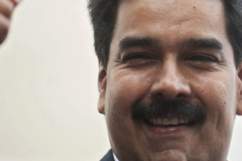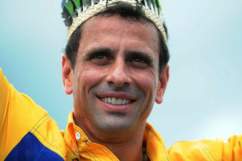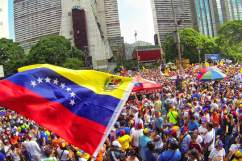NOTE: Heavy.com is reporting from the ground in Venezuela ahead of the April 14 elections to replace longtime leader Hugo Chavez, who died last month. Stay tuned for updates from correspondent Joanna Hausmann.
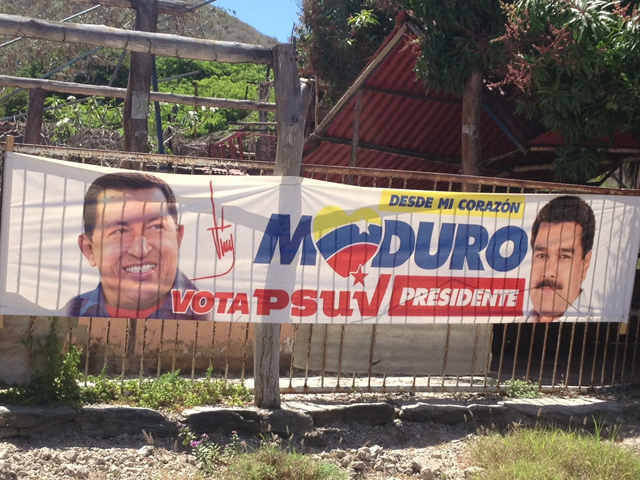
Nicolas Maduro has tied his campaign directly to deceased leader Hugo Chavez, as seen in his promotional posters. (Photo by Joanna Hausmann/Heavy.com)
NUEVA ESPARTA, Venezuela – Thursday marked the last day of campaigning in Venezuela’s presidential election, in which two men face each other to fill the position occupied for 14 years by the recently deceased Hugo Chavez. Now, the opposition’s center-left leader Henrique Capriles Radonski, as well as Chavez’s successor Nicolas Maduro, must remain quiet until election day this Sunday.
Campaigning may be over, but the election is the only thing on people’s minds.
The most recent tracking polls show that government-sponsored Maduro is leading by 5 to 7 percent. But just 10 days ago the opposition’s Radonski was a lofty 14 percent behind. Some believe that if this trend continues, Radonski may take the win and be the country’s new president on Monday.
Although the results are unclear, one thing is certain: In Venezuela you cannot escape politics. Politics is not only a part of life, it defines life. Every conversation, graffiti tag, joke, tweet, is a result of a highly politicized society that is looking toward this election with a complicated mix of fear and hope. But this obsession with politics is not due to the elections; it has been this way since the Chavez became the nation’s undisputed leader.
For 14 years, Venezuela had been defined by its late president. If you’re looking at Venezuela from the outside, Hugo Chavez is most likely the first thing that comes to mind. But before the military man was elected and became known as the as the “champion of the poor,” Venezuela was recognized for its stable democracy, oil, beauty queens, soap operas and the highest consumption per capita of Scotch whiskey and Viagra. This is no longer the case.
Hugo Chavez, during the last 14 years before his death, maneuvered a slow-motion revolution that dramatically but steadily changed the country’s political, social and economic structure. But more than that, Hugo Chavez became a beacon of division, as Venezuelans now — before anything else — define themselves as either being pro-Chavez or against Chavez, even after his death. Your feelings about Chavez and his regime define your identity in Venezuela.
“I am an anti-Chavista. That’s what I am,” said Maria, a poor grandmother of seven who owns a small empanada stand on a beach in Margarita Island, off the Venezuelan coast. Although she is revered for cooking the best empanadas in the region, Maria is barely making enough money to make ends meet. “We need a change. I can’t stand these Chavistas anymore.”
Although Maria is very much against Chavez’s Bolivarian Revolution, her empanada stand is sponsored by the government. “Do you think I like this thing?” she said as she pointed to the red sign with which the government takes credit for her stand. “They put it there to show off. But I never wanted it. I know for a fact that I’ve lost clients because of it… They put their name on everything anybody does.”
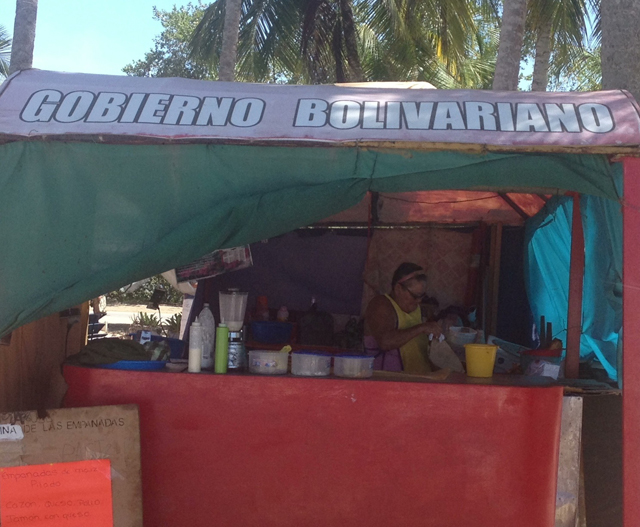
Maria cooking in her empanada stand. (Photo by Joanna Hausmann/Heavy.com)
When I asked Maria for her full name she refused. “I can’t give it to you. I don’t know what they’ll do. You never know what they can do,” she said, referring to the government. Suddenly the outspoken Maria, who had been so unabashedly open with her opinion, became surprisingly quiet. “Who do you work for?” she asked suspiciously. Even after I tried to quell her fears, she stopped talking.
From what I gather, this is a government that has used the profits of the national oil company and massive amounts of debt to garner supporters. Public spending has not gone to infrastructure or services but instead to cash transfers and subsidized housing, under the condition and with the expectation of political support.
Gregoria, a housekeeper in Caracas who, like Maria, refused to give me her last name, told me about her experience during Venezuela’s elections last October. “I had been offered a home by the government about two years ago. I’m still on the waiting list. The day of the October election, I decided not to vote. I didn’t feel anything for either party and I didn’t want to lose my spot on the list if I were to vote for Capriles. At 4 p.m., just when the voting centers were about to close, I got a call on my cellphone. It was some government person telling me they knew I hadn’t voted. They said they knew about my application for the house. They told me they were going to pick me up and take me to the voting center. So I went. I voted … I’m still waiting for that house.” When I asked her who she was going to vote for on Sunday, Gregoria remained quiet for a moment then sheepishly responded, “I don’t know.”
There is a widespread perception that government money is strategically used to win votes. “Government services are not seen as a citizen’s right, they are seen as a gift from the government,” said Ana Julia Jatar, an economist and political analyst. “Once they receive a ‘gift’ or the promise of one, the government makes sure they vote.”
In contrast with other oil exporters who have invested the windfall from the recent period of high prices, Venezuela’s infrastructure has dramatically deteriorated. Caracas, which had a reputation of being Latin America’s most modern city and which attracted hundreds of thousands of immigrants from Latin American and Europe, is no longer what it was. Slums are expanding, highways are crumbling and the murder rate has skyrocketed to international record-breaking numbers. During a time in which Venezuela has enjoyed the profits of the world’s highest oil prices to date, living standards across the country are falling. As I drive through Caracas it looks like a war-torn city — populated by beggars, bullet holes, graffiti and trash. It is hard to believe Venezuela is the country with the largest oil reserves in the world.
And yet, Maduro is still believed to be winning in the polls. Hugo Chavez is more than a president for many Venezuelans: He is a symbol of hope.
Sebastian Mora, a waiter at a restaurant on the island of Margarita, has been a staunch Chavez supporter for years. “I have voted for Chavez since 1998 and will continue to vote for him.” When I brought up the fact that Chavez has been dead for over a month, Sebastian quickly responded, “Yes, but he said Maduro would do his job. Maduro is Chavez in my book. They care about the people, you know. A lot of people have gotten help in my town. Nobody ever paid us much attention until Chavez.”
Sebastian proudly exhibits his tattoos. On his right shoulder he has stamped the silhouette of Che Guevara, and on his left – Hugo Chavez’s famous red beret.
What will happen this Sunday will forever change the history of this country. Regardless of who wins, the new president will have to deal with an overwhelming fiscal debt, the highest level of inflation on the continent, and a murder rate that trumps that of the Iraq War. But more importantly, the new president will have to deal with the polarization of its people. These fundamental 14 years have tragically divided Venezuela. As writer Leonardo Padron said in a televised event last Saturday for Venezuelan artists that have felt discriminated by the regime:
The street is an out of tune chorus of vengeance. Friendships crumble. Groups are fragmented. We suffer the symptoms of a virus called hate.
